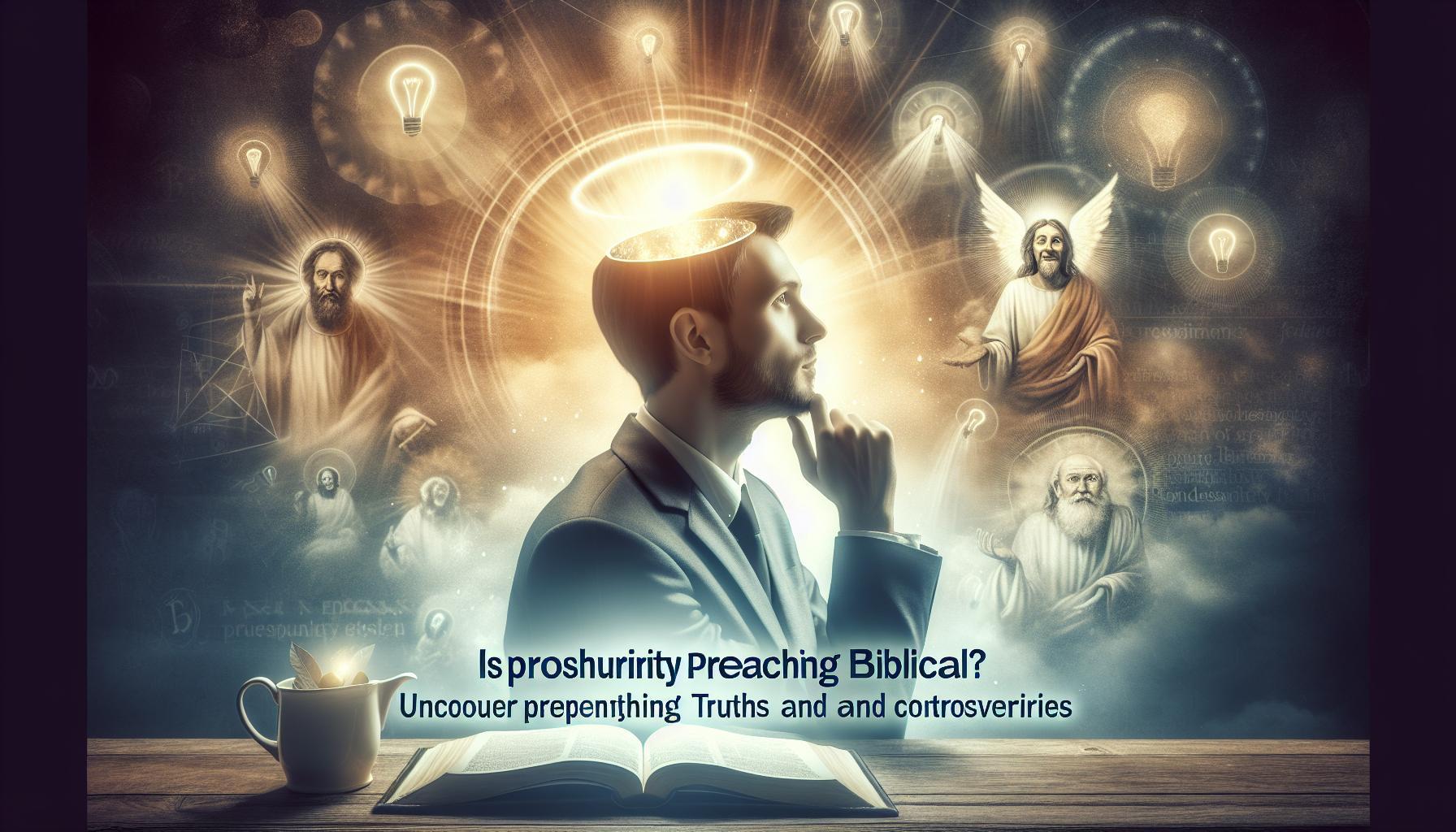Are you yearning for a transformative experience during sermons? Anointed preaching holds the power to captivate hearts and inspire real change. Understanding its signs and impact can deepen your spiritual journey and enhance your connection with faith. Discover how to recognize and experience this profound form of communication that resonates deeply with individuals and communities alike.
Understanding Anointed Preaching: A Spiritual Perspective
Anointed preaching is often described as a divine experience that transcends ordinary communication, captivating hearts and sparking spiritual transformation. It goes beyond eloquent speech; it is a unique blend of inspiration, empowerment, and divine truth. A preacher who speaks with authority and anointing can profoundly impact their audience, leading them not only to understand biblical principles but also to embrace them in a life-changing way.
Defining the Essence of Anointed Preaching
At its core, anointed preaching is the result of deep spiritual preparation and the active presence of the Holy Spirit. It involves a connection between the preacher and the congregation, fostering an environment where faith flourishes. Here are some essential characteristics that define anointed preaching:
- Divine Insight: The preacher possesses a deep understanding of scripture, enhanced by revelation that speaks to the current circumstances of the audience.
- Emotional Resonance: Anointed preaching touches hearts, often eliciting emotional responses that signal a movement within the soul.
- Life Transformation: Messages delivered under anointing typically lead individuals to make decisions for Christ and pursue a deeper relationship with God.
- Conviction of Sin: Anointed preachings often bring a heightened awareness of personal sins and a yearning for repentance.
Recognizing Impactful Elements in Anointed Preaching
The signs of anointed preaching can often be observed through distinct reactions from the congregation. Here are some indicators that can help you identify when a message is truly anointed:
| Indicators of Anointed Preaching | Consequences for the Audience |
|---|---|
| Heightened Engagement | Listeners are visibly attentive, taking notes and responding positively. |
| Spiritual Renewal | Individuals report feeling uplifted and spiritually rejuvenated after the message. |
| Visible Hunger for God | Congregants show a newfound desire for prayer, worship, and scripture engagement. |
| Collective Response | The congregation may collectively react, such as through altar calls and spontaneous worship. |
To experience this type of preaching, both preachers and congregants can take specific steps. Preachers should cultivate a close relationship with God through prayer and scripture study, inviting the Holy Spirit to lead their preparation. Congregants, on the other hand, can approach sermons with open hearts and minds, seeking God’s voice amidst the words spoken.
Engagement with anointed preaching often leads to deeper insights into God’s plans and purposes, providing an enriched experience of faith that encourages personal growth and communal unity. Through this divine interaction, individuals are equipped not just to receive knowledge but to act upon it, transforming their lives and communities in profound ways.
The Signs of Anointed Preaching: What to Look For
When attending a sermon, have you ever felt a profound connection to the message being delivered? That intangible feeling often signifies what many refer to as “anointed preaching.” It goes beyond eloquent speech or clever metaphors; it involves a spiritual resonance that underscores the significance of the message. Understanding the markers of anointed preaching can transform your listening experience, allowing you to discern messages that not only inform but also inspire deep spiritual growth.
Characteristics of Anointed Preaching
To identify anointed preaching, one can look for several key traits that often manifest during a sermon:
- Divine Energy: The preacher delivers the message with an unmistakable passion that ignites the spirit of the congregation. Their enthusiasm often leaves the audience feeling invigorated and inspired.
- Relevance and Impact: Anointed preaching transcends time and context, addressing pertinent issues that resonate deeply with its audience. It speaks to the heart, often prompting personal reflection and transformation.
- Scriptural Foundation: A hallmark of anointed preaching is its strong biblical foundation. The preacher thoughtfully integrates scripture into their message, providing context and relevance that deepen understanding.
- Conviction and Authority: The preacher communicates with a sense of authority, often drawing from personal experience or a profound understanding of the Word. This conviction leads to a deeper trust from the audience.
- Alterations in Mood: The atmosphere in the congregation shifts during an anointed sermon. You may notice increased emotional responses, such as crying, laughter, or even silence as individuals process profound truths.
Real-World Examples
One can observe the impact of anointed preaching through notable figures in the Christian community. For instance, renowned preachers such as T.D. Jakes or Charles Stanley have consistently demonstrated a unique ability to connect with their congregations, often leading to life-changing experiences for those listening.
Additionally, consider a personal anecdote: Imagine a young adult facing significant life challenges attending a sermon. The preacher unexpectedly addresses issues of self-worth and identity, not through a scripted outline, but rather through what seems like divine inspiration. The listener leaves feeling empowered and reassured of their value—a clear indication of the preacher’s anointing.
Practical Steps to Discern Anointed Preaching
To enhance your experience in discerning and recognizing anointed preaching during worship services, consider these actionable steps:
- Engage in Prayer: Before attending a sermon, pray for discernment. Ask for guidance to identify messages that align with your spiritual needs.
- Listen Actively: Pay attention not only to the words but also to the delivery and spiritual energy of the speaker. Note how the message relates to broader spiritual themes.
- Reflect Post-sermon: Take time after the sermon to reflect on the message. What emotions did you feel? How did the sermon challenge or change your perspective?
By spotting and embracing anointed preaching, you can enrich your spiritual journey, finding teachings that resonate and lead to meaningful transformation.
The Impact of Anointed Preaching on Congregations and Communities
In the realm of spiritual gatherings, the profound influence of anointed preaching cannot be overstated. Bright moments of divine inspiration during sermons can lighter the hearts of individuals and galvanize entire communities towards transformative action. Churches that experience anointed preaching often see an uplift in engagement, unity, and a renewed focus on their mission and community outreach.
Signs of Impact in Congregations
Anointed preaching is characterized by several telltale signs that indicate its effectiveness within congregations. Here are some of them:
- Heightened Engagement: Congregants actively participate in services, responding to the message with enthusiasm.
- Life Changes: Attendees report significant spiritual and personal transformations following impactful sermons.
- Increased Attendance: The engaging nature of anointed preaching tends to draw more people into the church.
- Community Outreach: Congregants feel inspired to take part in charitable activities and outreach programs.
The transformative power of such preaching extends beyond mere attendance; it nurtures an environment where members feel empowered to make positive changes in their lives and communities. Youth groups might blossom, while adult classes could experience revival, spurred by messages that resonate deeply.
Community Transformation
The effects of anointed preaching reach far beyond the church walls, rippling through the community at large. For instance, when a sermon emphasizes the plight of the local homeless population, congregants may react by organizing food drives or providing essential services. This direct response to a spiritual challenge not only aligns with the church’s mission but also actively improves the welfare of the community.
A striking example can be observed in a local church that, after a particularly anointed sermon on compassion, mobilized its members to create a neighborhood revitalization project. The project included cleaning parks, painting graffiti-stricken public buildings, and organizing community meals that brought together diverse groups. The initiative strengthened community ties and rekindled a shared sense of purpose among residents.
How to Foster Anointed Preaching
For churches aspiring to harness the power of anointed preaching, certain practical steps can be taken:
- Prayerful Preparation: Encouraging pastors to bathe their preparations in prayer can create a receptive spiritual atmosphere.
- Foster Spiritual Gifts: Recognizing and developing diverse spiritual gifts within the congregation can enhance the preaching experience.
- Encourage Feedback: Constructive dialogue about sermons can provide insights into the congregation’s needs and perceptions, making messages more impactful.
Ultimately, the goal of anointed preaching lies in its ability to foster a loving, dynamic, and proactive congregation that seeks to make a meaningful impact in their communities. The intertwining of deep spiritual messages and practical community engagement can lead to a powerful cycle of growth and transformation that resonates throughout the greater social landscape.
How to Prepare for Anointed Preaching: Mindset and Spiritual Practices
To truly experience the profound depth of anointed preaching, one must recognize that it extends beyond merely attending services or listening to sermons. It involves a transformative process that prepares both the mind and spirit to receive divine messages that can evoke change and inspire deeper faith. Understanding the essence of what anointed preaching entails—its signs and impacts—can significantly enhance the way you approach preparation for such experiences.
Mindset Shifts for Anointed Listening
To foster an atmosphere conducive to anointed preaching, it is crucial to cultivate the right mindset. This encompasses several key aspects:
- Anticipation: Prepare your heart with eager expectation. Anointed preaching requires a readiness to receive from God. Approach each service as an opportunity for divine encounter and transformation.
- Openness: Let go of preconceived notions about what a sermon should be. Be open to different styles of preaching, as anointed messages can come in varied forms.
- Receptivity: Engage actively with the message. This might mean taking notes, contemplating scriptural references, or discussing key points with others post-sermon.
Spiritual Practices to Embrace
Engaging in specific spiritual practices can enhance your preparedness for experiencing anointed preaching:
- Prayer: Begin with earnest prayer. Seek guidance and clarity from the Holy Spirit, asking for a deeper understanding and application of the message.
- Scripture Reading: Immerse yourself in the Word prior to the service. Familiarize yourself with relevant passages to lay a foundation for comprehension and reflection.
- Meditation: Spend time in quiet meditation, focusing on God’s presence. Allow yourself to be still and listen for His voice, cultivating an attentive spirit.
| Preparation Strategy | Benefits |
|---|---|
| Prayer | Facilitates spiritual readiness and invites the Holy Spirit’s influence. |
| Scripture Reading | Enhances understanding and connection with the preachedWord. |
| Meditation | Promotes peace and focus, allowing space for revelation. |
| Engagement with Community | Encourages shared insights and collective growth in faith. |
By implementing these strategies and exercises consistently, not only will you foster a conducive environment for grasping the powerful elements laid out in what constitutes anointed preaching, but you will also create a personal and communal atmosphere where transformative growth can emerge.
Experiencing Anointed Preaching: Creating an Atmosphere for Divine Encounter
Engaging with anointed preaching goes beyond mere attendance; it’s about creating an environment ripe for spiritual connection and transformation. When individuals gather in anticipation of divine revelation, the atmosphere can shift, inviting the presence of God into the midst of the worshippers. Preparation for this experience involves several key elements that collectively foster an openness to the Holy Spirit’s influence.
Prayer and Worship: The Foundation of Anticipation
One of the most effective ways to create a conducive atmosphere for anointed preaching is through prayer and worship. Before the sermon begins, a time dedicated to lifting hearts in prayer allows attendees to align their spirits with the intentions of the service. Incorporating worship, whether through songs or hymns, can profoundly impact the collective mindset, setting a tone of reverence and expectation. Consider the following approaches:
- Pre-service Prayer Groups: Encourage small groups to meet prior to the service for focused prayer, asking the Holy Spirit to move among the congregation.
- Worship through Music: Select worship songs that resonate with the theme of the message, promoting unity and an atmosphere conducive to revelation.
Creating an Environment of Expectation
An essential element in experiencing anointed preaching is fostering an environment where congregants feel encouraged to expect a divine encounter. This can be cultivated through various practical steps:
- Communicate the Importance: Utilize social media, newsletters, or church bulletins to share the significance of anointed preaching and how it can impact lives.
- Testimonies: Invite members of the congregation to share their personal experiences of how anointed preaching has transformed their lives. This not only builds faith but also creates a culture of expectancy.
- Visual and Physical Environment: Consider the arrangement of seating, lighting, and overall decor that can enhance the atmosphere. Soft lighting and open seating can create intimacy and focus.
The Role of the Preacher
While the congregation plays a critical role in shaping the atmosphere, the preacher also holds significant influence in facilitating a divine encounter. A preacher who is attuned to the Holy Spirit and passionate about delivering God’s message can ignite the hearts of the listeners. Here are some characteristics and practices that make for an effective anointed preacher:
- Sensitivity to the Spirit: A preacher should remain open and adaptable to the leading of the Holy Spirit, even adjusting their message as they sense the congregation’s needs.
- Engage Emotionally: Use storytelling, relatable examples, and emotional connection to draw the audience deeper into the message.
| Key Elements | Impact on Atmosphere |
|---|---|
| Prayer | Aligns hearts to God, fosters unity |
| Worship | Prepares the spirit, opens hearts |
| Expectation | Invites divine intervention, transforms focus |
| Engaged Preacher | Connects powerfully, delivers impactful messages |
By implementing these strategies, congregations can create a powerful atmosphere for experiencing anointed preaching, where divine encounters are not just hoped for, but actively anticipated. A spirited gathering allows the congregation to fully embrace the transformative impact of God’s word, fostering a deeper relationship with the divine and igniting a passionate pursuit of spiritual growth.
The Role of the Preacher: Qualifications and Spiritual Sensitivity
An effective preacher is not just a skilled orator but a spiritually attuned individual who understands the weight of their calling. In various religious communities, the term “anointed preaching” is frequently mentioned, referring to a divine empowerment that enhances the preacher’s message, making it resonate deeply within their audience. This special empowerment requires both spiritual sensitivity and certain qualifications that help a preacher effectively convey God’s word.
Essential Qualifications
To embark on the journey of preaching, an individual must meet certain qualifications that extend beyond formal education. These often include:
- Spiritual Maturity: A deep-rooted relationship with God, demonstrated through prayer, study of the Scriptures, and consistent spiritual growth.
- Theological Understanding: A thorough understanding of the Scriptures and sound doctrine enables a preacher to communicate effectively and accurately.
- Character Integrity: A preacher should exemplify Christ-like behavior, showcasing honesty, humility, and compassion in their personal and professional lives.
- Communication Skills: The ability to convey complex theological concepts in relatable ways is crucial for effective preaching.
Spiritual Sensitivity
Being spiritually sensitive is perhaps one of the most vital attributes for a preacher. This sensitivity allows the preacher to be attuned to the Holy Spirit’s guidance, enabling them to discern the needs of their congregation. A spiritually sensitive preacher can adapt their message to tackle the specific struggles and questions faced by their audience, making their preaching more impactful.
To cultivate spiritual sensitivity, preachers might consider adopting the following practices:
- Regular Prayer: Devoting time to seek God’s guidance ensures that the preacher’s heart is in tune with divine purpose.
- Listening to the Congregation: Engaging with church members through conversations and feedback can provide insight into their spiritual journeys and needs.
- Reflective Study: Taking time to meditate on Scripture and Seek God’s insight can go a long way in developing messages that resonate on a deeper level.
| Qualification | Description |
|---|---|
| Spiritual Maturity | Developing a deep, personal relationship with God through prayer and Scripture. |
| Theological Understanding | Grasping sound doctrine to communicate effectively. |
| Character Integrity | Exemplifying honesty and compassion in personal and professional life. |
| Communication Skills | The ability to make complex theological ideas relatable and understandable. |
The interplay between these qualifications and spiritual sensitivity creates a powerful platform for anointed preaching. As preaching evolves, understanding these components becomes essential for both aspiring and seasoned preachers to create lasting impacts on their communities. By embodying these principles, preachers can lead their congregations toward deeper connections with God, enabling transformational experiences that define anointed preaching.
Anointed Preaching Across Denominations: Common Threads and Unique Expressions
The phenomenon of anointed preaching resonates powerfully across various Christian denominations, demonstrating a universal quest for divine connection through the spoken word. Often referred to as being “led by the Spirit,” such preaching transcends mere oratory; it embodies a transformative experience that impacts both the speaker and the congregation. While the styles and expressions of anointed preaching may differ widely—from the fervent calls of a Pentecostal service to the reflective tones found in Anglican homilies—there are underlying threads that connect these experiences.
Common Threads in Anointed Preaching
Across diverse faith traditions, several common threads signify the essence of anointed preaching:
- Spiritual Empowerment: Regardless of denomination, anointed preaching is characterized by a deep reliance on the Holy Spirit. Preachers often claim a sense of empowerment that transcends their abilities, allowing them to convey messages that resonate on a spiritual level.
- Scriptural Foundation: Anointed messages are rooted in scripture. Effective preachers meticulously weave biblical truths into their messages, ensuring that the church is grounded in the Word of God, irrespective of their theological slant.
- Authentic Engagement: The preacher’s authenticity plays a crucial role in the reception of the message. Congregants are drawn to leaders who share personal experiences and vulnerabilities, making the message relatable and impactful.
- Transformational Impact: Anointed preaching often leads to profound changes in the lives of listeners. Whether through altars filled with seekers or quiet moments of reflection, the fruits of this preaching are evident in transformed hearts and lifestyles.
Unique Expressions Across Denominations
While the core elements of anointed preaching remain constant, the expressions vary. Here are notable examples:
| Denomination | Typical Expression | Impact and Significance |
|---|---|---|
| Pentecostal | High-energy sermons, often interspersed with spontaneous worship and prayer. | Encourages physical manifestations of worship, such as speaking in tongues and healing. |
| Baptist | Expository preaching that dives deep into scripture. | Fosters a strong understanding of biblical text and its applications in daily life. |
| Anglican | Liturgical sermons that blend tradition with personal reflection. | Provides a sense of continuity and reverence, appealing to a contemplative worship style. |
| Non-Denominational | Casual yet passionate addresses that prioritize personal storytelling and contemporary issues. | Connects effectively with a diverse audience, addressing modern-day challenges and triumphs. |
These unique expressions illustrate how diverse communities utilize anointed preaching to foster an intimate connection with the divine. As different congregations seek to understand “What Is Anointed Preaching? Signs, Impact, and How to Experience It,” they each adapt to their context while upholding the transformative power that lies at the heart of the gospel. By recognizing both the commonalities and distinctions in preaching styles, congregants can better appreciate the richness of God’s message across denominational lines.
Nurturing Your Own Anointing: Steps to Enhance Your Preaching Ministry
To shine as a preacher, it’s essential to embrace and cultivate your unique anointing—an inner calling that empowers you to connect deeply with your audience. Anointed preaching goes beyond mere eloquence; it’s about the divine synergy between your message and the Holy Spirit’s influence. Developing this anointing requires intentional steps, nurturing both your spiritual life and your preaching skills.
Fostering Spiritual Growth
A solid spiritual foundation is crucial for an impactful preaching ministry. Here are key practices to enhance this aspect:
- Consistent Prayer: dedicate time daily to commune with God, seeking His guidance and inspiration for your sermons.
- Scripture Meditation: engage in deep meditation on the Scriptures, allowing their truths to permeate your heart and mind.
- Fellowship: surround yourself with spiritually mature individuals who can challenge and encourage your growth.
- Self-Examination: regularly assess your spiritual health and motivations, striving for purity and authenticity in your ministry.
Honing Your Preaching Skills
Improving your preaching ability is necessary to convey the message effectively. Consider these actionable steps to refine your craft:
- Study and Learn: read books by renowned preachers, attend workshops, and engage in coursework focused on homiletics (the art of preaching).
- Practice Delivery: rehearse your sermons multiple times to master your delivery, pacing, and body language.
- Seek Feedback: welcome constructive criticism from peers or mentors, using it as an opportunity for growth.
Aligning with Your Audience
Understanding your audience is key to ensuring that your message resonates. Take these steps to connect with those who hear your sermons:
- Know Their Needs: conduct surveys or have informal conversations with congregants to discern their spiritual and emotional needs.
- Adapt Your Messages: tailor your sermons to address the specific circumstances and challenges faced by your congregation without compromising biblical truths.
- Engagement Techniques: utilize storytelling, visuals, and questions to create an interactive experience that holds your audience’s attention.
Utilizing Your Unique Gift
Every preacher has a distinct calling and set of gifts. Embrace and develop yours to enhance your preaching ministry:
- Identify Your Style: reflect on your natural strengths in communication whether they be analytical, relational, or charismatic.
- Incorporate Your Passion: infuse your sermons with themes and topics you’re genuinely passionate about to ignite fervor in your preaching.
- Pray for Guidance: seek the Holy Spirit’s leading in choosing sermon themes that align with your calling and the congregation’s needs.
By focusing on these practical steps, you can cultivate your anointing, ensuring that your preaching ministry leaves a profound impact on your audience. Engaging deeply with the principles of anointed preaching will enhance your ability to communicate God’s message effectively, fostering transformation within yourself and your congregation.
Q&A
What is Anointed Preaching?
Anointed preaching refers to a style of delivering messages that is believed to be empowered by the Holy Spirit. It often leads to profound spiritual experiences in the audience and fosters connections with God.
This type of preaching is characterized by a sense of urgency and authenticity, often resonating deeply with listeners. It aims to communicate scriptural truths in a way that encourages personal transformation, spiritual awakening, and renewed faith. For more insights into this topic, check out our article on the signs of anointed preaching.
Why does anointed preaching matter?
Anointed preaching matters because it can profoundly affect the spiritual lives of individuals within a congregation. The impact can lead to life-changing decisions and a deeper commitment to faith.
This style of preaching emphasizes God’s message and power, creating an atmosphere that invites divine interaction. When the Holy Spirit is at work, hearts may be stirred, leading to repentance, healing, or renewed purpose. Such preaching aims not just for information but for transformation, making it essential in many faith communities.
Can I experience anointed preaching?
Yes, you can experience anointed preaching by actively seeking environments where spiritual growth is prioritized. This often happens during worship services, retreats, or prayer meetings where the presence of the Holy Spirit is welcomed.
To enhance your experience, engage in prayer and prepare your heart to receive the message. Listening attentively and participating in the worship context can open you up to an encounter that feels divinely orchestrated. Communities that value anointed preaching will often encourage personal participation for fuller impact.
What are the signs of anointed preaching?
Some signs of anointed preaching include emotional reactions, a sense of conviction, and a lasting impact on listeners. Additionally, such preaching often leads to communal worship experiences and personal testimonies.
When the message resonates deeply, listeners may feel a profound sense of hope and encouragement. Other indicators include spontaneity in worship, increased congregational engagement, and a noticeable movement of the Spirit among attendees, leading to transformations in beliefs and behaviors.
How can I prepare for anointed preaching?
To prepare for anointed preaching, start with prayer and clear your mind of distractions. Cultivating a heart open to God’s message allows for a deeper reception of the preaching.
It’s also helpful to come with an expectation of encountering God. Engage with the scriptures being shared beforehand and reflect on personal spiritual needs. This focused approach can open your heart to receive the specific message God intends for you during the service.
Why do different denominations approach preaching differently?
Different denominations have unique traditions and theological emphases that shape their approach to preaching. This diversity stems from distinct interpretations of scripture, worship styles, and community needs.
For example, some denominations may emphasize emotional expression during preaching, while others may focus on intellectual discourse. Understanding these diverse approaches can enrich your appreciation of anointed preaching and encourage learning from various faith traditions.
The Way Forward
As we conclude our exploration of anointed preaching, we’ve journeyed through its defining characteristics, the signs that indicate its presence, and the profound impact it can have on congregations. Anointed preaching transcends the mere delivery of a sermon; it is a powerful encounter with the divine that fosters spiritual transformation and communal growth. Understanding how to recognize and experience this unique form of preaching opens pathways for deeper engagement within our faith communities.
We encourage you to reflect on the principles outlined in this article and consider how they can apply to your own experiences in worship or ministry. Whether you find yourself in a pulpit or simply seeking to deepen your understanding as a member of your congregation, the essence of anointed preaching invites everyone to draw closer to God and each other.
We invite you to further engage with these concepts—attend discussions, read more, and share your thoughts. Together, let us nurture an environment where the Spirit’s movement can flourish, enriching our preaching and, ultimately, our lives in faith.




